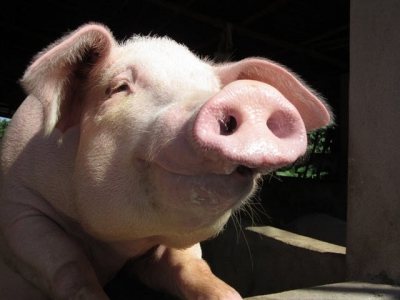Study Mannanase, multi-enzyme supplementation improves feed efficiency in pigs

Ireland based researchers have found that xylanase or xylanase + β-glucanase dietary supplementation does not seem to improve feed efficiency in grow-finisher pigs.
However, they also saw the use of mannanase and multi-enzyme complexes did improve both growth and feed efficiency at that life-stage.
The findings, published in Animal Feed Science and Technology, were drawn from a systematic review and meta-analysis that the animal scientists carried out.
They wanted to see which exogenous enzymes with which diet type most consistently improve pig growth, nutrient digestibility and feed efficiency. They used a dataset of 39 comparisons from 67 peer-reviewed publications.
“The response to enzyme supplementation is influenced by the main cereal source used in the diet formulation. Dietary supplementation with mannanase increased feed efficiency with maize-based diets and dietary supplementation with multi-enzyme complexes improved feed efficiency when maize-, wheat-, barley- and co-product-based diets were fed to grow-finisher pigs,” concluded the researchers.
As feed represents around 72% of the total cost of producing pigs (Teagasc, 2016) and pigs are unable to utilize all dietary components, strategies to improve feed efficiency are of particular interest as a means of increasing environmental as well as economic sustainability (Aarnink and Verstegen, 2007; Clark and Tilman, 2017), said the team.
Dietary supplementation of pig diets with exogenous enzymes has been suggested as one such strategy. However, the team noted that inconsistent results are found in the literature.
Xylanase + β-glucanase supplementation
Lead author, Peadar Lawlor, who is a research officer based at Teagasc’s Pig Development Department, in Moorepark, Cork, Ireland, told FeedNavigator that of particular interest was their observation that xylanase or xylanase + β-glucanase supplementation did not appear to improve feed efficiency in grow-finisher pigs despite their fairly widespread use in wheat and barley based diets.
“At Moorepark, we have recently supplemented xylanase + β-glucanase to barley-wheat-soybean diets in a number of trials with grow-finisher pigs and, in some trials, we found improvements in FCE of 0.10 FCE units, however, other times we did not find any response to the enzyme.”
Lawlor found the consistency in response to mannanase supplementation surprising, while he said the consistent benefit arising from the multi-enzyme complexes was interesting.
"There is not a lot of work published on protease yet, but this also looks promising. We have also found this to be the case in experiments conducted here in Moorepark in recent years where improvements in FCE were found in response to protease supplementation. This is certainly an enzyme to watch.”
This meta-analysis only accessed published work, he stressed.
“One thing that might be important in all of this is that companies sponsoring work on their enzymes do not always publish work on their enzymes when results are not good,” cautioned Lawlor.
Source: Animal Feed Science and Technology
Authors: A Torres-Pitarch, E G Manzanilla, G E Gardiner, J V O’Doherty, P G Lawlor
Có thể bạn quan tâm
 Research links experimental transmission of ASF virus through feed
Research links experimental transmission of ASF virus through feed As an African swine fever (ASF) outbreak has moved rapidly throughout China and threatens to spread to new countries in Europe
 Putting grass protein to the test in pigs
Putting grass protein to the test in pigs Researchers based at Aarhus University in Foulum, Denmark are optimistic they can partially replace traditional protein ingredients like soy with clover grass
 Study examines potential role of feed in ASF spread
Study examines potential role of feed in ASF spread African swine fever may be orally transmittable in plant-based feeds and liquids, although higher doses of the virus are needed to generate infection from feeds